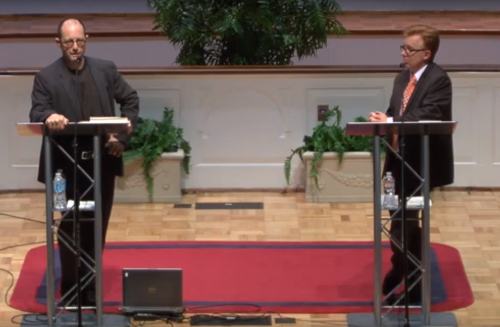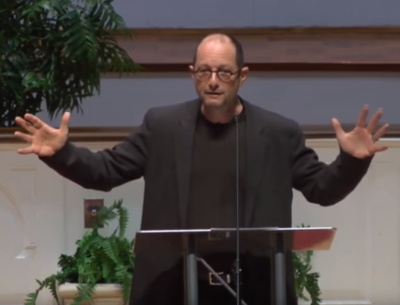Podcast: Play in new window | Download
Subscribe: Spotify | Email | RSS
 Did the earliest Christians, and so the earliest gospel (Mark), teach that Jesus was a man, and not a God-man, who was in a sense divinized by God, at his baptism or at his post-resurrection exaltation? Did this message transmogrify into the view that “Jesus is God” by the time the fourth gospel (John) was written, around the last decade of the first century?
Did the earliest Christians, and so the earliest gospel (Mark), teach that Jesus was a man, and not a God-man, who was in a sense divinized by God, at his baptism or at his post-resurrection exaltation? Did this message transmogrify into the view that “Jesus is God” by the time the fourth gospel (John) was written, around the last decade of the first century?
Or have Christians all along thought that Jesus was divine and human, equal with us in being human, and yet equal with God in his divinity, only changing, over the centuries, in how they expressed this faith?
In this episode I review the first portion of a recent debate/discussion between Dr. Bart Ehrman and Dr. Michael Bird, held at the at the 2016 Greer-Heard Point Counter Point Forum in February 12-13, 2016 at the New Orleans Baptist Theological Seminary.
I see both as right about some matters and as mistaken about others. I hold that there is a third way here, a way that is arguably more charitable to the authors of the gospels. Here’s the inconsistent triad I use at the start of this episode to differentiate our views:
- The New Testament gospels agree in their core claims about Jesus and God.
- Matthew, Mark, and Luke don’t teach that Jesus is God.
- John teaches that Jesus is God.
Dr. Ehrman denies 1. Dr. Bird denies 2. I deny 3. You?
This episode marks the return of my trusty old machine, the LogicBot 2000, who you may remember from episode 79. He’s called into service here to separate valid from invalid arguments.
Let us know what you think in the comments below, in our Facebook group, upload audio feedback for possible inclusion in a future episode of this podcast, putting the audio file here.
You can also listen to this episode on Stitcher or iTunes (please subscribe, rate, and review us in either or both – directions here). It is also available on YouTube (you can subscribe here). You can support the trinities podcast by ordering anything through Amazon.com after clicking through one of our links. We get a small % of your purchase, even though your price is not increased. (If you see “trinities” in you url while at Amazon, then we’ll get it.)
Links for this episode:
- the official debate video: “How Did Jesus Become God?” – Bart Ehrman and Michael Bird in Dialogue + Q&A
- Dr. Bart Ehrman
- Dr. Michael Bird
- Dale on John, Mark, God, and Jesus
- Do the Gospels disagree about Jesus and God? Part 1 – Three Options
- Do the Gospels disagree about Jesus and God? Part 2 – Counting the Costs
- podcast 70 – The one God and his Son according to John
- Who Should Christians Worship?
- God and his Son: the logic of the New Testament
- Does Mark teach that Jesus is God?
- Mark: Jesus is God’s Son, the Messiah
- podcast 31 – Dr. William Hasker on the “Arian” Controversy
- podcast 30 – The Council of Nicea
- podcast 29 – Arius
 Acts 13:32-33
Acts 13:32-33- John 1
- Wolfson, The Philosophy of the Church Fathers, Third Edition
- “Trinity,” Stanford Encyclopedia of Philosophy
- podcast 11 – Tertullian the unitarian
- This week’s thinking music is “Call for Surrender“ by Jesse Spillane. His homepage is jessespillane.com.

Really? Are our pastors telling us the truth?
Are Christian pastors honest with their congregations
regarding the evidence for the Resurrection?
Is there really a “mountain of evidence” for the Resurrection
as our pastors claim or is the belief in the Resurrection based on nothing more than assumptions, second century hearsay, superstitions, and giant leaps of faith?
You MUST read this Christian pastor’s defense of the Resurrection and a review by one of his former parishioners, a man who lost his
faith and is now a nonbeliever primarily due to the lack of good evidence for
the Resurrection:
—A Review of LCMS Pastor John Bombaro’s Defense of the
Resurrection—
(copy and paste this article title into your browser to find
and read this fascinating review of the evidence for the Resurrection)
Gary,
Bart Ehrman’s skepitcal approach is presumptive and based upon a lot more speculation than evidence. Some people (including pastors) chose to become skeptics (like Ehrman) and deny the historical evidence based upon the same presuppositions.
Make sure that you are being careful to ask critical questions about Ehrman’s argumentation just as he claims to be posing critical questions about the validity of the apostolic testimony. Keep in mind that publicity and controversy sell books, and that is where Ehrman has found his niche.
Ehrman’s material does offer a good measure of “balance” with respect to the importance of not overstating the case for “verbal and plenary inspiration”, but he certainly doesn’t have enough evidence to warrant dismissing the canonical stories about Jesus and the resurrection.
Good point. I note that his handling of whether historians can address miraculous claims seems lacking to me. On the one hand, like Sagan’s Saw, it does seem comonsensically, but in the end it seems lacking. I also tend to agree with some of the critiques that WLC and others have pointed out about his reasoning on probability.
Dale,
From a Biblical Unitarian perspective, some would deny both #2 and #3.
The reason for this is because the writer of the 4th Gospel indicates that Jesus’ claim to be “the son of God” was also “making himself equal with God.” This is evident in John 5:18 and John 10:33. Other texts, like John 1:1 and John 1:18 could also be taken to support the same claim (as understood by the writer of the 4th Gospel).
Thus, if we all agree that #1 is correct, then it’s also reasonable to suggest that the “son of God” emphasis in the Synoptic Gospels may have been understood as a claim to be “equality” with God (in some sense, which must be interpreted).
Since the purpose of the 4th Gospel was to emphasize that Jesus is “the son of God” (John 20:31), it makes perfectly good sense that the writer would strongly emphasize that Jesus was “calling God his own Father” (John 5:18) and that the Jews understood the implication of saying “I and the Father are one” (John 10:30) was “making himself out to be God” (John 10:33).
Hi Dale. This is what you refer to as the “inconsistent triad”:
1. The New Testament gospels agree in their core claims about Jesus and God.
2. Matthew, Mark, and Luke don’t teach that Jesus is God.
3. John teaches that Jesus is God.
Here is my comment.
1. Contrary to Ehrman’s “developmental” view, and to Dale’s “humanistic unitarian” view, the New Testament gospels are NOT incompatible in their core claims about Jesus and God.
2. Matthew, Mark, and Luke don’t teach that Jesus is God, BUT they all teach that Jesus is the Son of God. Including Mark, and in the most obvious sense of the expression “Son of God” (see Mark 1:1; 3:11; 5:7; 15:39).
3. Nope, John teaches that Jesus is the Son of God, and the Christ (or Messiah). Only about the Logos it is said, theos hên ho logos.
Dale,
I just watched the Trump rally in Maine today and there was somebody holding up a Trump sign that said “Hi Dale”. Maybe the guy is also a fan of the Trinities Podcast.
I love Your review, you say some Things that I was thinking when watching the debate myself.
One thing you point out that grates me a lot when People have these debates. They don’t distinguish exactly what they mean when they use the term Divine or God. Bart Ehrman does this just as much as trinitarians, they say such and such is exaulting someone to divinity and making him a god, and then thinking this is a step toward any kind of Trinitarianism, it is not.
The fact that (as Bart Ehrman Points out) individuals are divinized in Judaism prior to Jesus doesn’t move one step toward Yahweh being one being inhabited by Three persons, or that an individual is Yahweh himself. This is a very important point, very often trinitarians use exaultation Language to imply that Christians were already on their way to trinitarian theology and they just had to work it out, this is simply wrong.
If I said by Brother got elected to being the Mayor of paris, that is not one inch closer to saying that France is a monarchy and my Brother is the King of France. In the same way, Jesus being declared Divine in the way that individuals in the past were said to be Divine, i.e. an immortal Heavenly being and/or someone to be honored as God’s annointed King does not get us one inch closer to the Trinity, InFact the tow are incompatible.
Another thing that doesn’t really fit is when Bart Ehrman says he’s not a theologian and isn’t there to talk theology, but then goes on to make theological distinctions, if Your going to determine the theological position of the earliest Christians and it’s Development you neccessarily are going to have to do theology, it’s impossible not to. Which is why he ends up making all sorts of theological mistakes, such as the embarrasing moment in his debate With Justin Bass where he Calls the idea that Jesus is Jehovah Modalism and a Heresy :/.
Btw, the Logic Bot startup made me chuckle 🙂
Roman,
Good points.
You stated at some point in this podcast that the worship of humans was not unique to Christ in 2nd Temple Jewish traditions. You gave as examples the worship of a king.
Here is a quote from the Epilogue of Larry Hurtado’s 3rd edition of One Lord One God that I happened to be reading this evening.
“[Fletcher-Louis] cites several texts as reflective of second-temple Jewish tradition in which this or that human figure [kings and priests] receives worship, and he contends that this practice is treated in these texts as appropriate and acceptable…I have reviewed his argument and the texts he cites, concluding that they do not actually show cultic worship given to the figures in question, and, more crucially, also point out that none of the texts gives any indication that any human figure was worshiped in the actual cultic practice of any know second-temple Jewish groups”.
Yowzers!
I really enjoy the challenges you pose. And I equally enjoy it when I stumble upon their defeaters.
Hello Dale, I didn’t seem to grab your attention last time I tried, but I’ll give it a go once more this time. I had a debate a couple days ago on the question of whether Paul believed that Jesus was God or not. I uploaded it last night and thought you might be interested. Here’s a link: https://www.youtube.com/watch?v=X4AlsnGzN4s.
On the topic of this post, I haven’t listened to the video yet but I did hear your discussion with Ehrman a while ago. I remember being pretty disappointed with him during the podcast. He didn’t seem to have an intelligible position on whether Jesus was actually God or not. If I recall, he pretty much said they did and didn’t at the same time and and he was averse to your questions seeking clarification, e.g. about what “God” even means.
Thanks for posting your debate.
Hi – yes, I saw this on the Facebook group. Haven’t had time to watch it yet. Thanks.
Hi Servetus, nice to see that you also honor Michael Servetus.
Comments are closed.